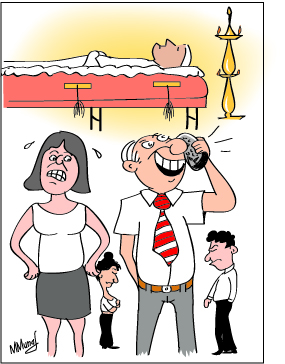Is it time to ring in mobile phone etiquette?
It’s a common sight: walk into any restaurant and take a quick look around. Chances are you’ll see at least half of the diners busy, not engaged in animated conversation but absorbed in their mobile phones.
It seems we can’t put them down. Our mobile phones have become so essential to daily living that we can hardly bear to turn our attention away, even briefly, to enjoy the company of friends or family unhindered.
Switch to another scene: You are attending a funeral and in the midst of prayers for the deceased, the loud ring of a mobile phone disturbs the sombre and sad occasion. The owner blithely answers his call seemingly oblivious to the glares of other mourners.
There’s no doubt the mobile phone is one of the most commercially used inventions of modern time. Evolving from its primitive “Gadol Bage” state to a smart hub of applications and opportunities, the mobile phone is now a must-have. Last year’s Central Bank Economic and Social Statistics Report of Sri Lanka revealed that by the end of 2013, 99 out of every 100 Sri Lankans owned at least one mobile phone. Furthermore, in a country of 20.4 million people there is a mobile phone population of 20.3 million. These statistics prove the popularity as well as necessity of cellular phones.
“I can’t spend a day without my phone. You need it to survive,” said three-wheeler driver Wasantha Ranasinghe from Sapugaskanda.
M.J. Fernando who is the manager of Watch House at Majestic City agrees. “I have my phone on for at least 15 hours of the day because my customers call me,” he said.
This device has become so integrated into dailylife that it has created a culture of its own.
So is there a code of proper conduct when using a mobile phone or should we simply use our good judgment to decide when answering a phone call is appropriate?
Senal, Buddhika and Manuja- a trio of post O/L students who were chilling at the Arcade Independence Square said there shouldn’t be rules on using mobile phones as their use is personal.

Nirosha Priyadarshani
Nirosha Priyadarshani who is a housewife from Homagama disagrees. “People don’t know how to behave with their cell phones. They should be taught when, where and how to use phones,” she said.
Mobile phone etiquette is a combination of accepted behavioural rules and correct judgment, many feel.
“How to conduct yourself with your mobile phone is a matter of self-discipline, respect for others, logic and common courtesy,” said the founder and head of the finishing school Arden Institute, Nedra Wickremasinghe.
She added that most business etiquette programmes allocate time to talk about mobile phone usage because people forget the basics of civil behaviour when they have phones in hand.
Mobile phone etiquette is an evolving concept as the gadget is advancing with each technological generation. Therefore it acquires more capabilities that might offend someone when used in a group or public context. For example, the over use of emoticons which were a recent introduction to texting is perceived as annoying.
However, there are universal don’ts for mobile phone users.
A cellular phone must be switched off or put on silent mode at a Universal Quiet Zone like a library, hospital, movie theatre (especially when the movie starts to play), at a wedding or funeral, in public transport, at meetings and any other instance where silence must be maintained.
Using or checking someone’s mobile phone without permission is an invasion of privacy.
Avoid answering phone calls in a public location. If you absolutely must, move nine to ten feet away from the crowd and speak at a controlled volume. Strangers are not so interested in the developments of your love life or grocery requirements for the week.
Constantly glancing at the phone screen or fiddling with the phone in the presence of others is impolite as it shows a lack a respect for the people you are with.
It is unacceptable to keep staff like cashiers at a supermarket waiting until you finish a phone call or type a text message.
Basically, at any moment that requires your attention it is best to keep the mobile phone away.

M.J. Fernando
In general, etiquette is not an equation. One must use their good judgment when deciding to use the phone. In the case of an emergency or an awaited business call, courteously ask the other person(s) for permission to use the phone.
Certain professionals believe that there should be a rule book about cell phone use especially in a working environment. The French expert on Branding and Digital Strategy, Minter Dial, proposed a standard framework known as CREST for cell phone usage. He said context, relationship, expectation, setting and time are the factors that must be considered when using the phone.
Recently, Washington DC and a theme park in Chongqing, China, as a social experiment demarcated a special pavement for people who text while walking. These lanes have a mobile phone painted on them. Yet, messaging someone while walking or crossing the road is not acceptable as it could be dangerous to the user.

It’s personal: Senal, Buddhika and Manjuja. Pix by Athula Devapriya
A study on road deaths by a team of academics from the Peradeniya University revealed that one in every six deaths is due to roadaccidents. Using cellular phones while driving is on the list of causes. It is against road rules as it violates “road user discipline”, said the report.
Yet people continue to do so. “I have been working on the roads for 17 years and have seen so many people walking or driving while chatting on the phone. Some people talk so loudly!” exclaimed a street sweeper in Colombo, Dayasirige Gunawathi.
There is a growing belief that to remain connected, people must always be on the mobile phone or any other technological device that aids communication. This is a myth and continuous use of the cell phone can lead to addiction, experts warn.
“Using your phone 24 hours a day is a disorder common in people with bad life management skills. I have treated over 200 cases of addiction to mobile phones and computers. They are mostly children who live in a virtual world,” said well-known consultant in Counselling Psychology, Dr. H.R.S Keerthisinghe.
Discretion is the key in mobile phone etiquette. Moreover, this is not a unique system of behaviour because it is based on what human beings are taught in their formative years: common courtesy and respect for others. If we keep this in mind it may be easier to not offend others through the use of our mobile phones, important as they are to our daily lives.


